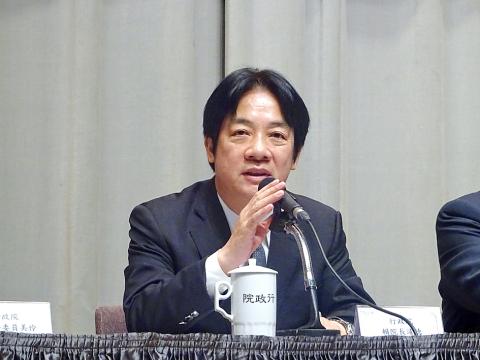It is an indisputable fact that Taiwan is a nation and its name is the Republic of China (ROC), Premier William Lai (賴清德) said yesterday, in response to Beijing’s insistence that Taiwan and China belongs to “one China.”
“Cross-strait relations are not state-to-state relations. There is no one China and one Taiwan. Taiwan is an indivisible part of Chinese territories. It has never been and will never be a country. China steadfastly opposes any form of Taiwanese independence,” China’s Taiwan Affairs Office spokesman Ma Xiaoguang (馬曉光) said earlier yesterday.
“A nation is composed of its people, territory and sovereignty,” Lai told a news conference after presiding over an Executive Yuan meeting on attracting investments to Taiwan. “We elect our own president and officials; the people pay taxes to the government. By any metric, Taiwan is a sovereign and independent nation.”

Photo: Lee Hsin-fang, Taipei Times
It was a reiteration of his comment during a legislative question-and-answer session on Tuesday, when he said: “We are a sovereign and independent country and its name is the Republic of China.”
Lai’s beliefs are in line with those of President Tsai Ing-wen (蔡英文), Executive Yuan spokesman Hsu Kuo-yung (徐國勇) said.
“We are an independent and sovereign state whose name is the ROC. This is the president’s position, whom, I should add, was elected president of the ROC,” Hsu said.
Asked whether Lai’s position is new, Hsu responded in the negative, saying that former vice president Lien Chan (連戰) had said the same thing in the past.
“Was it not the Chinese Nationalist Party’s (KMT) official position that the ROC is a sovereign and independent nation? If any KMT member thinks we are not a sovereign and independent nation, now is the time to speak up,” Hsu said.
“The spirit of the premier’s comments are consistent with the government’s position on cross-strait policy,” Mainland Affairs Council (MAC) Minister Katharine Chang (張小月) said.
The government has consistently followed the ROC Constitution, the Act Governing Relations Between the People of the Taiwan Area and the Mainland Area (兩岸人民關係條例) and relevant laws, she said.
“The administration seeks peace, stability and good communications in cross-strait relations, but we insist that exchanges should be conducted under the premise of equality and dignity,” Chang said.
The international community recognizes Taiwan for its freedom, democracy, human rights and rule of law, she added.
“The future of Taiwan and cross-strait developments must be determined by Taiwan’s 23 million people. This is the national consensus and a fact that China would do well to understand,” the MAC said.
The Democratic Progressive Party (DPP) also issued a statement repeating Lai’s comments that Taiwan is a sovereign and independent nation whose name is the ROC.
A majority of Taiwanese believe that any changes to the “status quo” must be democratically approved by the public, the DPP said.
“Because the TAO’s cross-strait policy position runs counter to what the majority of Taiwanese believe about their own national identity, no support for it will be forthcoming from Taiwanese society,” the DPP said.
The Chinese government should recognize the ROC’s existence as a fact and commit itself to resolving differences with dialogue, rather than obstructing the normal development of ties across the Strait for political reasons, the DPP said.
Additional reporting by Hung Mei-hsiu

SECURITY: As China is ‘reshaping’ Hong Kong’s population, Taiwan must raise the eligibility threshold for applications from Hong Kongers, Chiu Chui-cheng said When Hong Kong and Macau citizens apply for residency in Taiwan, it would be under a new category that includes a “national security observation period,” Mainland Affairs Council (MAC) Minister Chiu Chui-cheng (邱垂正) said yesterday. President William Lai (賴清德) on March 13 announced 17 strategies to counter China’s aggression toward Taiwan, including incorporating national security considerations into the review process for residency applications from Hong Kong and Macau citizens. The situation in Hong Kong is constantly changing, Chiu said to media yesterday on the sidelines of the Taipei Technology Run hosted by the Taipei Neihu Technology Park Development Association. With

CARROT AND STICK: While unrelenting in its military threats, China attracted nearly 40,000 Taiwanese to over 400 business events last year Nearly 40,000 Taiwanese last year joined industry events in China, such as conferences and trade fairs, supported by the Chinese government, a study showed yesterday, as Beijing ramps up a charm offensive toward Taipei alongside military pressure. China has long taken a carrot-and-stick approach to Taiwan, threatening it with the prospect of military action while reaching out to those it believes are amenable to Beijing’s point of view. Taiwanese security officials are wary of what they see as Beijing’s influence campaigns to sway public opinion after Taipei and Beijing gradually resumed travel links halted by the COVID-19 pandemic, but the scale of

A US Marine Corps regiment equipped with Naval Strike Missiles (NSM) is set to participate in the upcoming Balikatan 25 exercise in the Luzon Strait, marking the system’s first-ever deployment in the Philippines. US and Philippine officials have separately confirmed that the Navy Marine Expeditionary Ship Interdiction System (NMESIS) — the mobile launch platform for the Naval Strike Missile — would take part in the joint exercise. The missiles are being deployed to “a strategic first island chain chokepoint” in the waters between Taiwan proper and the Philippines, US-based Naval News reported. “The Luzon Strait and Bashi Channel represent a critical access

Pope Francis is be laid to rest on Saturday after lying in state for three days in St Peter’s Basilica, where the faithful are expected to flock to pay their respects to history’s first Latin American pontiff. The cardinals met yesterday in the Vatican’s synod hall to chart the next steps before a conclave begins to choose Francis’ successor, as condolences poured in from around the world. According to current norms, the conclave must begin between May 5 and 10. The cardinals set the funeral for Saturday at 10am in St Peter’s Square, to be celebrated by the dean of the College